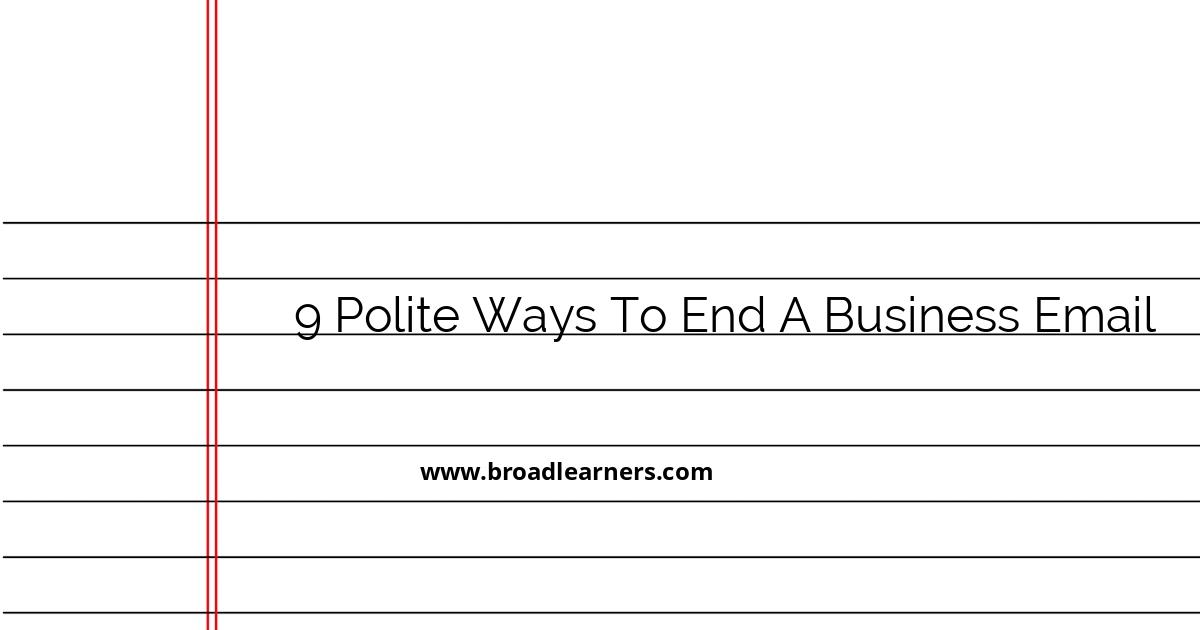Ending a business email with a polite and professional closing is crucial for leaving a positive impression. The closing of your email can set the tone for future interactions and strengthen your professional rapport. Here are 9 polite ways to end a business email:
- Best regards,
- Sincerely,
- Thank you,
- Kind regards,
- With appreciation,
- Warm regards,
- Best wishes,
- Respectfully,
- Yours truly,
Now, let us delve into each alternative in more detail:
1. Best regards,
This is a widely-used and versatile closing that conveys professionalism and respect. It's suitable for both formal and informal business emails.
Example:
Dear Mr. Smith,
Thank you for considering my proposal. I look forward to your feedback.
Best regards,
John Doe
2. Sincerely,
"Sincerely," is a traditional closing that communicates honesty and authenticity. It is often used in more formal business communications.
Example:
Dear Ms. Watson,
I appreciate the opportunity to work on this project. Please let me know if you need any further information.
Sincerely,
Emily Johnson
3. Thank you,
Ending a message with "Thank you," is appropriate when expressing gratitude or appreciation towards the recipient. It adds a polite touch to your email.
Example:
Hi Sarah,
Thank you for your assistance with the recent project updates. Your insights were invaluable.
Thank you,
Michael Lee
4. Kind regards,
This closing strikes a balance between formality and friendliness, making it suitable for a wide range of business emails.
Example:
Hi Anna,
Attached above is the report you requested. Let me know if there’s anything else you need.
Kind regards,
Tom Harris
5. With appreciation,
This closing is a way to express gratitude, making the message feel more personal and considerate, especially after receiving assistance or support.
Example:
Dear Robert,
I am grateful for the opportunity to collaborate with you. Your expertise has been instrumental in progress.
With appreciation,
Linda Green
6. Warm regards,
A slightly more casual variant of "Best regards," perfect for communications where you want to convey a sense of warmth and friendliness.
Example:
Hi Emily,
Thank you for all your hard work this week. We couldn’t have met our deadlines without you.
Warm regards,
David Chen
7. Best wishes,
This is a goodwill closing that wishes the recipient well and conveys positivity, suitable for emails with a personal touch.
Example:
Dear Team,
I hope you all have a wonderful upcoming weekend.
Best wishes,
Rebecca Scott
8. Respectfully,
A formal closing that shows respect towards the recipient, ideal for emails to clients or individuals in higher positions.
Example:
Dear Dr. Nelson,
Thank you for considering my application. I am keen on the opportunity to work with your esteemed institution.
Respectfully,
Chris Evans
9. Yours truly,
A sincere and formal closing that suggests sincerity and goodwill. It is usually used in more formal business correspondences.
Example:
Dear Professor Moore,
I appreciate your time and attention to my request. I hope to hear from you soon.
Yours truly,
Sophia Turner
By incorporating these nine polite closings, you can effectively end your business emails on a professional and courteous note. These alternatives ensure that your communication remains respectful and considerate, fostering better professional relationships.

Did I miss anything? Respond below